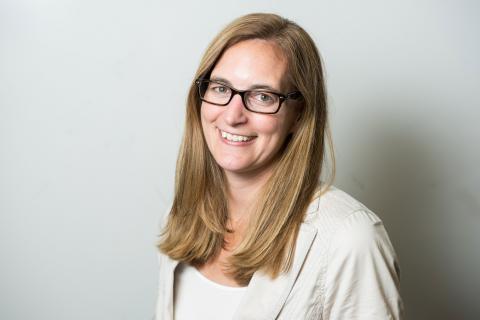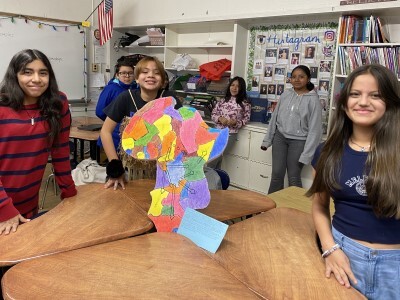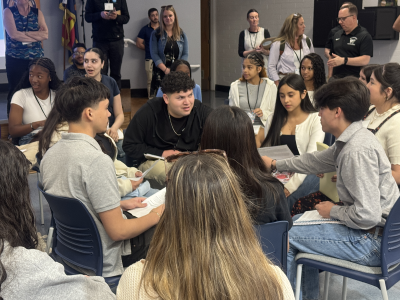The Possibilities for Next Gen Professional Learning
Topics

Educators are the lead learners in schools. If they are to enable powerful, authentic, deep learning among their students, they need to live that kind of learning and professional culture themselves. When everyone is part of that experiential through-line, that’s when next generation learning thrives.
Practitioner's Guide to Next Gen Learning
NGLC and its partners in the Next Gen Professional Learning Project asked educators to share with us their use of and perspectives on next gen learning for teachers and this is what we learned.
This past winter, NGLC and its partners in the Next Gen Professional Learning Project asked NGLC grantees, along with other forward-leaning educators, to share with us their use of and perspectives on next gen learning for teachers. In this edition of Friday Focus: Practitioner’s Guide to Personalized Learning, we’d like to share with you what we learned from the survey about these four aspects of next gen professional learning:
- Innovative practices
- Strategies for growth (aka scale)
- Technology tools
- Professional development providers
In a nutshell
We think of next gen professional learning as essentially next gen learning for teachers—reflecting the same design principles as next gen learning for students—and, importantly, in service of facilitating next gen learning for students. This notion was reinforced by many responses in the survey, such as this one:
“We recognize most educators haven’t experienced PL [personalized learning] or CBL [competency-based learning], therefore we need to use professional learning as one of the ways we train and engage our adults to create new learning experiences for our students.”
We created the survey because we wanted to understand what next gen learning for teachers looks like in practice and what it looks like when districts and charter management organizations attempt to bring it to hundreds or thousands of educators.
Overall, what emerges from the survey is a commitment to educator-led, agency-driven professional learning. And, consistent with that commitment we discovered a bottom-up, viral approach to scale, enabled by participation in networks. Networks facilitate, sustain, and grow next gen professional learning. In keeping with an agency-driven professional learning philosophy, networks also appear to play a gatekeeping function of sorts for tools and providers.
The Educators
We sought school, district, and teacher-leaders who are designing and delivering and supporting professional learning for teachers. We intentionally targeted organizations that were more likely to be interested in or engaged in next gen professional learning. In addition to asking NGLC schools to complete the survey, we enlisted the help of other networks: this included the Next Gen Systems Initiative, National Center for Montessori in the Public Sector, Highlander Institute, School ReTool, Future Ready Schools, Digital Promise, and more. A total of 226 schools, districts, charter organizations, and other school partners participated.
Innovative Professional Learning Practices
We asked participants about 18 characteristics and qualities of next gen professional learning. This table identifies the characteristics that the most participants identified as a “core approach of our model.” The top five reflect authentic, collaborative experiences and emphasized a focus on direct classroom practice and impacting personalized, next gen student learning.

Educator Agency: Ninety-three percent (93%) of participants are at some stage of adopting the characteristic, “Educator drives the learning.” This is one of the most widely embraced characteristics of the 18 options. Throughout the survey, participants generally articulated a learner-centered philosophy, which reaffirms to us the centrality of educator agency. Here’s one example:
“Our teachers are lead learners who are designers, facilitators, navigators, mentors, encouragers, and leaders who continuously work on improving the learning experiences designed for students and are highly respected experts who have a global impact on teaching and learning.”
Conditions for Success: Participants selected culture, mindset, and funding/resources as the most important conditions for successful next gen profession learning.
- A culture that values next gen professional learning. A way of working, with complete buy-in (educators, district administrators, parents, community members), a learning organization.
- A mindset of learning together. A commitment to share practices, to learn continuously, to facilitate learning at all levels of the organization.
- Funding and resources. Examples of next gen student learning practice and next gen adult learning, assistance with educating the community, open source tools, release time for staff to learn.
Strategies for Growth
The survey results indicate that among those already engaged in next gen student learning, demand for quality next gen professional learning “at scale” exists. There is an expressed desire of survey participants to scale next gen professional learning organization-wide (66%) and in some cases even beyond organizational boundaries (38%).
Strategies: The most frequently reported mechanisms for providing next gen professional learning to all educators in their organizations are pilot programs, personal learning plans, online resources, peer-to-peer coaching, and professional learning communities. For the 38 percent of participants with intentions to reach teachers beyond their organizations, the most oft-mentioned strategies are:
- Partnerships (with a provider or regional-type networking organization)
- Institutes, workshops, PLC, institutional rounds
- Hosting and/or participating in signature events/conferences
- Hosting school visits/sharing via designated “model site”
- Leveraging M.Ed. credentials
- Online training/courses
Enabling factors: The greatest factors enabling more educators to learn through next gen professional learning are local demand for change (57%) via community or teachers or students; and participation in a national network (45%) such as League of Innovative Schools or Summit Basecamp. The least-cited enabling factors for our survey participants are micro-credentials (21%) and platforms/tools (17%).
“The teachers were so excited, the approach contagious, and the results visible. From here, creating professional learning communities, shared leadership, and other means to build collective capacity was easy. Teachers want to learn, stretch, and grow and they want to do it in collaboration with others—within their discipline, across disciplines, within the school and with other experts.”
Barriers: Respondents identify insufficient time (48%, with many open-ended responses referencing “contracted time”) and available funding (38%) as the most common challenges to reaching more educators. Other barriers include a lack of strategies and models (33%) and lack of content (29%), showing some need for “proven practices” and sources of inspiration.
Technology Tools
We learned that educators are using technology tools mostly to manage the process of professional learning and to help teachers connect and collaborate. Participants identified 107 distinct tools/methods for professional learning, but the top 14 tools/methods represent a majority (60%) of the responses. The most reported tools are Google (20%), Schoology (6%), and Canvas (5%). All three of these tools function as agnostic platforms allowing users to manage learning, create or integrate content, and collaborate with colleagues.
We also learned that only 35 percent of participants feel satisfied with the tools they are using. All participants, regardless of whether tools are meeting their needs or not, agree that platform improvements are needed to help them manage the process of professional learning: better data interoperability between tools, more advanced learning plans for teachers, and dashboards for tracking teachers’ learning.
We find these responses interesting because using learner profiles for educators and incorporating mastery-based professional learning are among the next gen professional learning characteristics least likely to be used by survey participants (see the table below) and wonder if it’s driven at least in part because tools are not meeting those needs.
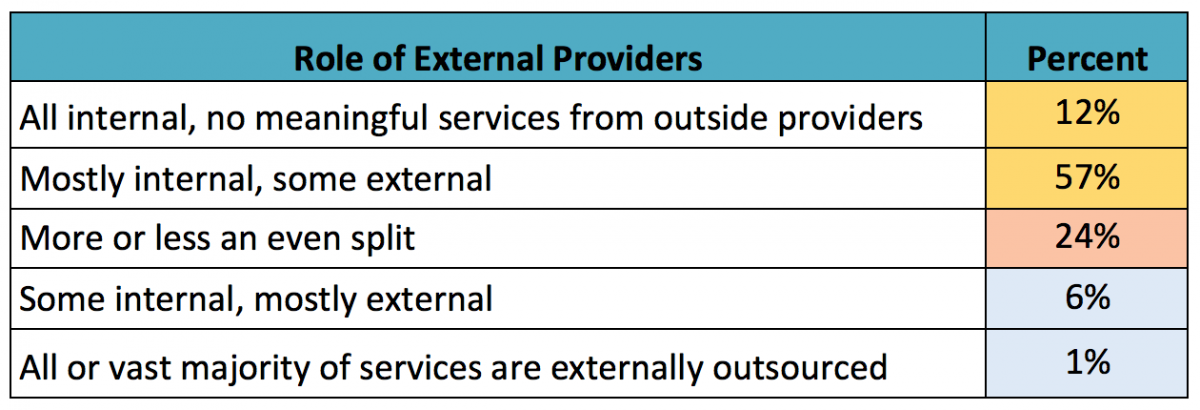
Professional Development Providers
Most participants in the survey conduct their professional learning internally (70%, in yellow in the table below). Only 7 percent rely on all or mostly external support providers (in blue).
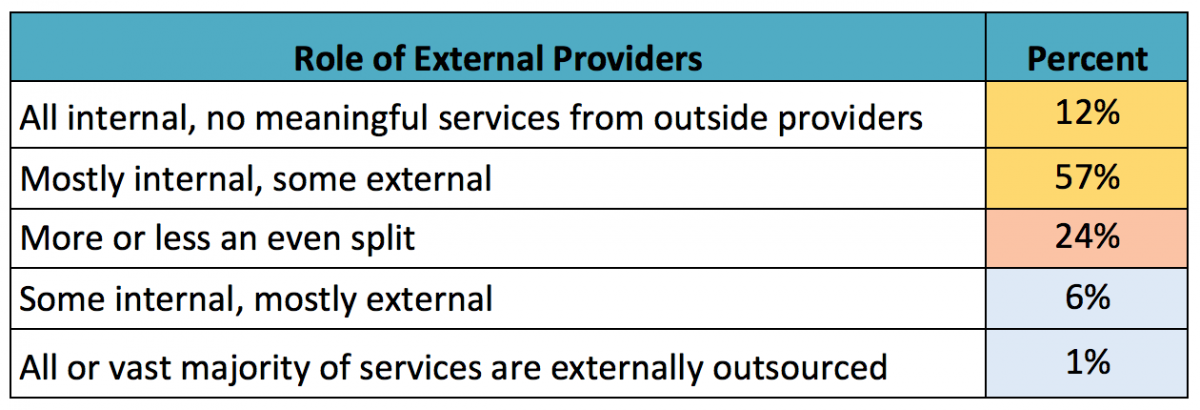
While this might suggest that participants rely on internal supports because they can’t find providers, we actually found that only 10 percent of participants rated “Don’t know how to access or can’t identify support providers that meet our needs” as a challenge to scaling next gen professional learning. This was the least-cited barrier to scaling out of the nine barriers that we posed. Another possibility why you rely so heavily on internal supports might be because participants are—by definition of who we surveyed—innovators.
This trend of providing their own next gen professional learning is also consistent with the high rate of activity we found related to the characteristic, “educator drives the learning”. It raises the question: What is the role of external providers when professional learning is educator-driven?
Overall, when asked what services participants would like to see emerge from providers to help them design and implement next gen professional learning, the responses fell into two categories, both suggesting a preference for component services rather than whole services:
- Specific expertise/coaching to solve specific problems. It’s important to consider this finding in light of the fact that most of our survey participants are members of a network. Organizations in the broader education community are less likely to have the comprehensive support that survey participants have through their support networks and full-service design partners.
- Open educational resources or low-cost professional learning resources. This is consistent with the finding that a key barrier to scale is a lack of resources, and suggests a possible role for providers that is critical for scaling next gen professional learning. It’s important once again to consider that our survey findings reflect the perspectives of educators who are already engaged in this work. It may be that those who are about to enter next gen professional learning do need whole services.
Additional Resources
- Transforming Professional Learning: Why teachers’ learning must be individualized—and HOW - This report from the Center for Teaching Quality draws on research and teacher insights to explore these questions: How can teachers’ expertise be spread more systematically and widely? How can states and districts recognize the learning of teachers? And how can schools and districts create the conditions for teachers to lead so that their students learn in deep and personalized ways?
- Moving from compliance to agency: What teachers need to make professional learning work - This report from Learning Forward and NCTAF outlines a model that describes how teaching growth occurs and how developers can frame their work around this natural process.
- How teachers are learning: Professional development remix - This is an in-depth report from EdSurge on the tools advancing teacher training, including personalized learning communities, strategies, and tools for educators in the digital era.
- Talking with Faculty About Cognitive Science and Learning - This brief essay by John Girash of Harvard University in the publication, Essays on Teaching Excellence, shares some ideas about balancing the “hard research” of pedagogy with “ideas that are so digested for practitioners’ use that the underlying research is completely obscured.”
- Beyond PD: Teacher Professional Learning in High-Performing Systems - From the National Center of Education and the Economy, this report draws lessons from high-performing education systems in British Columbia, Hong Kong, Shanghai, and Singapore. Professional learning in these systems is developed around an improvement cycle tied to student learning and supported by leadership roles, resource allocation, and evaluation and accountability measures.
Related Articles
- Adult Project Based Learning (PBL): Our Summer of Joyful Hard Work! - When adults experience project-based learning, they can see what it’s like for students to engage in learning that's meaningful, complex, sustained, and open to many solutions.
- From Classrooms to Campfires: Fostering Educator Growth with Symmetrical Learning Adventures - A camp for teachers provides immersive professional learning opportunities that mirror the community, agency, and joy of deeper learning for students.
- Student Voice in Teacher Professional Learning - Teachers can study their content area, child development, and pedagogy, but students are the best "source" to really know if instruction is engaging, relevant, and appropriately challenging.

